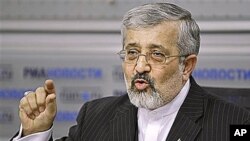Iran will meet with representatives of the so-called "P5+1" nations Friday and Saturday in Istanbul. This round of talks about Iran's nuclear program is a follow-up to discussions held last month in Geneva.
When officials from the P5+1 nations - the United States, Britain, France, Russia, China, plus Germany - sit down with Iran's representatives, their expectations will be the same as before. They want Tehran to be fully open about its nuclear program - including uranium enrichment and possible weapons development. The latter, if true, would violate the Non-Proliferation Treaty that Iran signed in 1972.
From Iran's side, the message going into the Istanbul talks is clear. Iran's President, Mahmoud Ahmadinejad, in a speech on January 19 said, "In the view of the Iranian nation, Iran's nuclear issue is finished ... sit down and cooperate with nuclear Iran."
The wide gap between the two sides is dampening optimism that the Istanbul talks will make substantial progress in resolving Iran's nuclear stance. One analyst with that view is Ploughshares Fund President Joseph Cirincione.
"I think the outlook for the talks is still pessimistic," said Cirincione. "There really is no sign that Iran trusts the P5+1 [nations], or is willing to make the kind of concessions that would make a compromise possible."
But another nuclear analyst, Michael Elleman with the London-based International Institute for Strategic Studies, said that after four rounds of UN sanctions and the threat of more, Iran has good reasons to try to bridge the gap.
"The fact that they are talking and they are continuing the process is encouraging to me," said Elleman. "The question will be how much progress is enough to forestall other measures that people will inevitably start calling for. But I think this is a good step and we need to keep our expectations low and hope for the best."
Iran has, in recent times, engaged in talks and then agreed to talk more in the future. At the Middle East Institute, analyst Alex Vatanka said that at the end of the Istanbul discussions, Iran needs to keep that process up, or face the consequences if it doesn't.
"So, you know, we can expect a statement, perhaps, on more talks," said Vatanka. "That would be a plus. On the minus side, you could see a collapse, and the idea of more sanctions happening by [next] summer, most likely."
However, Cirincione and other critics said Iran is simply using these talks to stall for time while it continues to work on its nuclear program, including, possibly, nuclear weapons.





